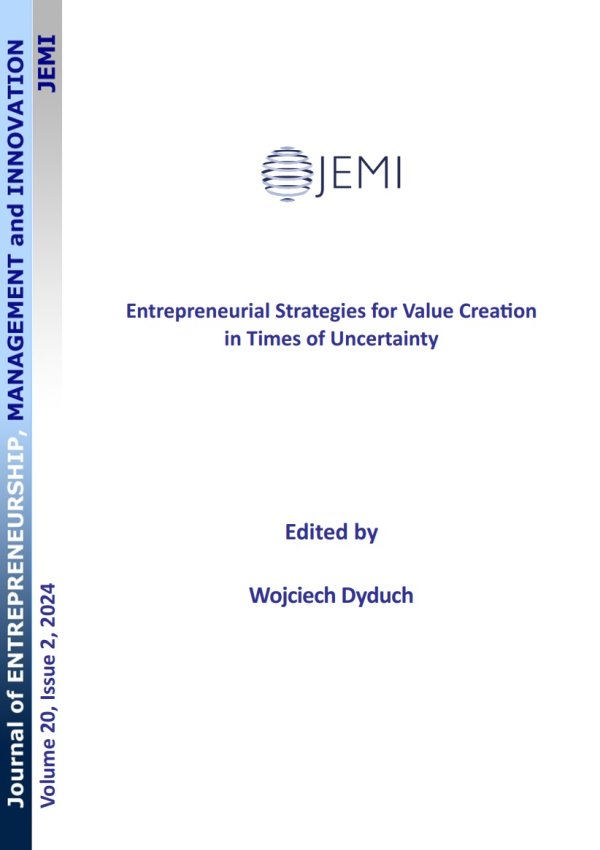Nestor Shpak, Prof., Professor of the Department of Management and International Business, Lviv Polytechnic National University, 12 Bandera str., 79013 Lviv, Ukraine, e-mail: This email address is being protected from spambots. You need JavaScript enabled to view it. 
Zoriana Dvulit, Prof., Professor of the Department of foreign trade and customs, Lviv Polytechnic National University, 12 Bandera str., 79013 Lviv, Ukraine, e-mail: This email address is being protected from spambots. You need JavaScript enabled to view it. 
Liana Maznyk, Ph.D. in Economics, Associate professor of the Department of Labour Economics and Management National University of Food Technology, 68 Volodymyrska str., 01033 Kyiv, Ukraine, e-mail: This email address is being protected from spambots. You need JavaScript enabled to view it. 
Włodzimierz Sroka, Prof., Professor of the Department of Management, Faculty of Applied Sciences, WSB University, Dąbrowa Górnicza, Poland and University of Johannesburg, South Africa, e-mail: This email address is being protected from spambots. You need JavaScript enabled to view it. 
Olha Podra, Ph.D. in Economics, Associate professor of the Department of foreign trade and customs, Lviv Polytechnic National University, 12 Bandera str., 79013 Lviv, Ukraine, e-mail: This email address is being protected from spambots. You need JavaScript enabled to view it. 
Nataliia Petryshyn, Ph.D. in Economics, Associate professor of the Department of foreign trade and customs, Lviv Polytechnic National University, 12 Bandera str., 79013 Lviv, Ukraine, e-mail: This email address is being protected from spambots. You need JavaScript enabled to view it. 
Abstract
PURPOSE: Our study aims to develop an innovative approach to scientific substantiation and practical balance of interests of cargo owners and transport companies, which will serve as a tool for freight management. METHODOLOGY: A specific algorithm of actions is proposed, which initially provides the creation of a system of indicators to study transportation management. The research methods include a complex method of semantic differential modeling, which integrates correlation-regression analysis, cluster analysis, and expert evaluations. The basis of such a complex method is the integration of three components: i) a system for monitoring the satisfaction of consumers of transport services; ii) the assessment of the density of connections between cargo turnover by type of transportation and the leading transportation indicators; iii) a multidimensional assessment of the homogeneity of factors by hierarchical clustering. FINDINGS: Semantic differential modeling can serve as an effective tool in strategic planning, not only for transport companies and railway enterprises, but also for those institutions where it is necessary to identify the most important areas of activity. IMPLICATIONS: The use of semantic differential based on the involvement of quantitative methods of mathematical modeling allows increasing the degree of validity of management decisions. The harmonization and balancing of interests in the field of B2B take into account the results of modeling the semantic differential in management. The proposed methodology consists of main indicators of rolling stock transportation and certain economic indicators; we advise to focus on. These indicators were obtained through cooperation with an expert group of participants in the transportation process. Application of the created model allows defining priority directions in the field of freight owners’ service by the Ukrainian railways in the dynamics by types of cargo and transportation and substantiating the corresponding management decisions by freight carriers. ORIGINALITY AND VALUE: Innovation is a complex interdisciplinary integration of research methods based on the philosophy of semantic differential, allowing the integration of approaches to harmonize the interests of transport companies and consumers of their services with the results of cooperation in the field of freight transportation. Therefore, the developed innovative methodology can be used not only for railway transport but also for other types of transport and business.
Keywords: modeling, harmonization of interests, semantic differential, freight transport, cargo owners, innovative approach, cluster analysis, correlation-regression analysis, transport management






